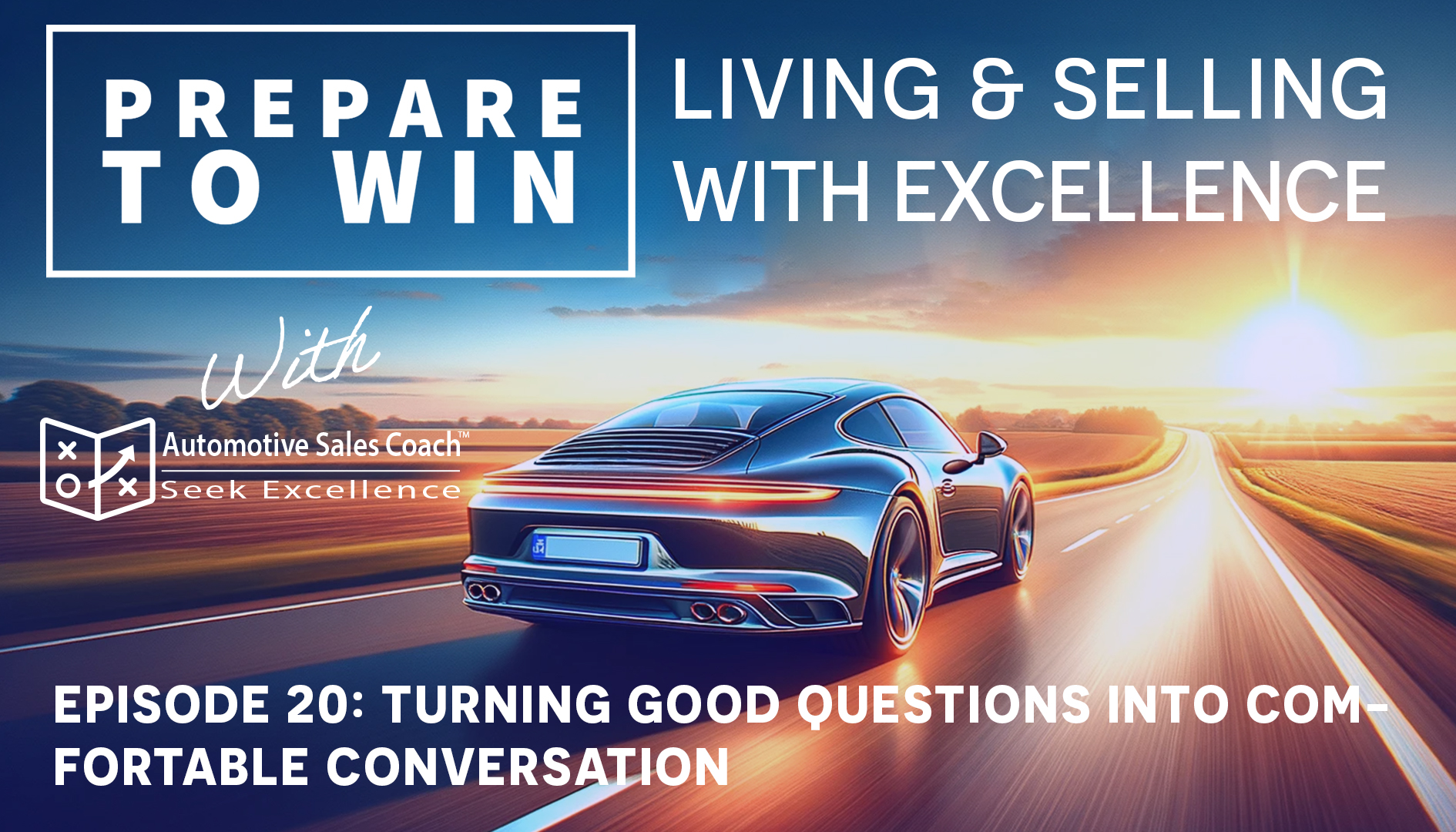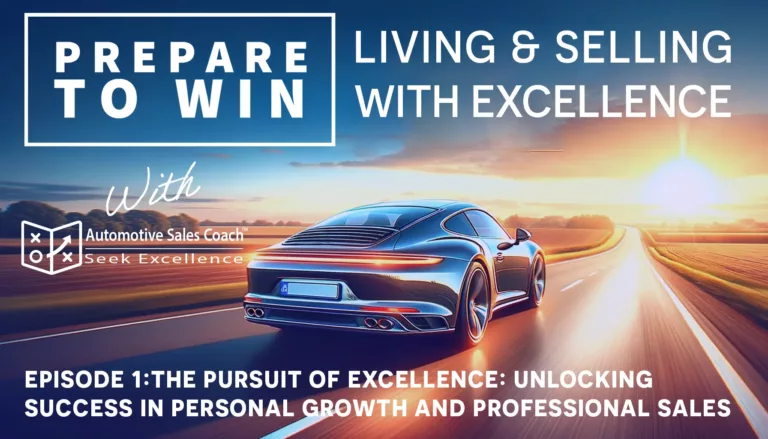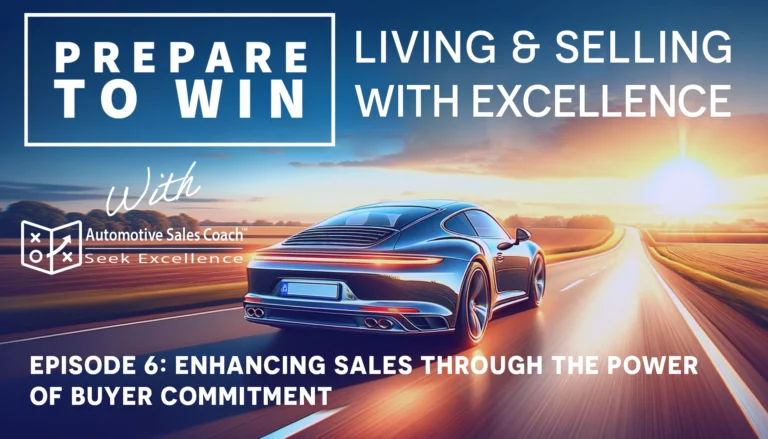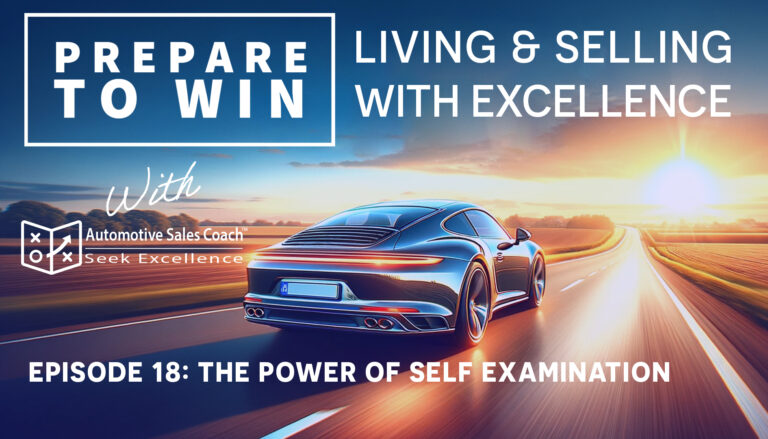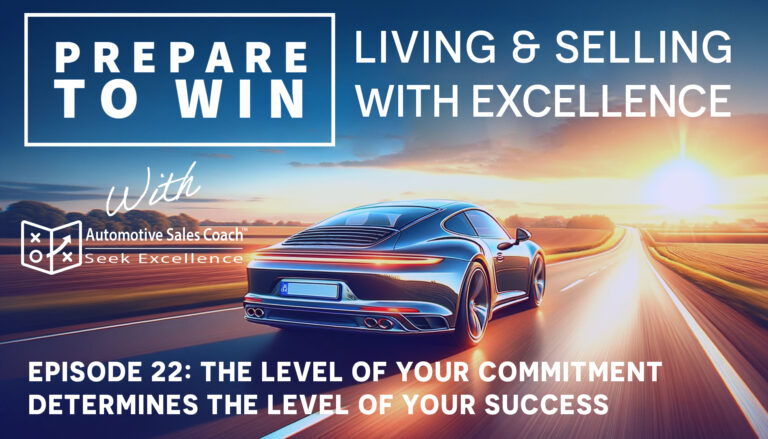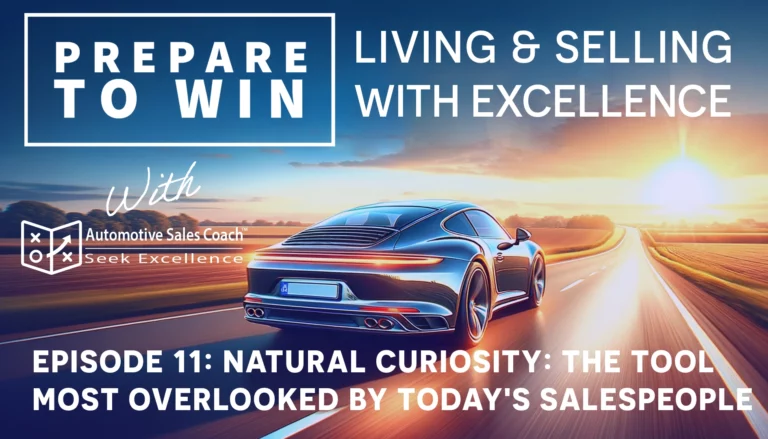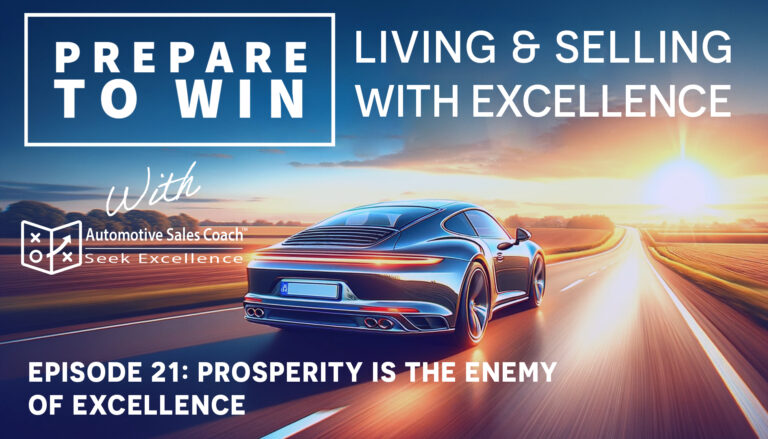Today, we dive into the transformative power of turning good questions into comfortable conversations in the world of automotive sales. We share insights into why understanding the buyer beyond the surface level—exploring their family, work, and play—is crucial in today’s sales environment.
Sales is not just about the transaction but about the stories we share, the questions we ask, and the relationships we build.
Whether you’re a seasoned sales professional or new to the field, this episode offers valuable insights into mastering the basics brilliantly and transforming every customer interaction into an opportunity for connection and growth.
David Lowe: 0:00
On today’s episode, learn how to turn good questions into comfortable conversation. Stay tuned.
Grace Lupoi: 0:13
Hi guys, I’m Lupoi and and I’m here with David Lowe, the Automotive Sales Coach, and, like he said, today we’re talking through turning good questions into those comfortable conversations and what that looks like to really have a good conversation. That gets me some more great information.
David Lowe: 0:30
Yeah right, so, conversationalists, we’re kind of lost, isn’t it?
Grace Lupoi: 0:33
Right, oh yeah.
David Lowe: 0:35
So we’re talking to dealerships, automotive sales coach. We have many dealerships and we love to spend time in dealerships, love salespeople, work career salespeople. We love them and we want to help encourage them, inspire them to be better. Right, and one of the things we’ve noticed that during COVID a lot of people isolated right and even on the show, on the floor, a lot of people spend more time kind of looking at their phone than conversing right. So many salespeople today started during that COVID and haven’t really been exposed to it and maybe many of our salespeople in their 20s kind of grew up in the video game era, in the iPhone era and then the COVID era and this art of conversation has kind of fallen by the wayside. That’s right. I also many adults that I know.
Grace Lupoi: 1:28
Not just sales, Not just right Any professor.
David Lowe: 1:31
I’ve lost the art of conversation. It’s almost like the Seinfeld comedy was all about self right. I thought we were talking about me here, so Elaine would talk about herself and Jerry would hijack the conversation talking about himself and that would go right. That was the. That was the funny part of it. That’s why this, this, this functional relationship they look like they’re always together, but they weren’t. They’re always focused on what Self right. So this conversation, the art of conversation, has been a little bit lost.
David Lowe: 2:04
Now, if you’ve been following the podcast, you know we’ve done many episodes on communication. Communication is the key to customer service Right, it’s the key to sales. We’ve done episodes on natural curiosity, asking good questions, active listening right. Listening for what’s being said, not said or trying to be said right. We’ve done episodes all that support this and I bet we come back and do more episodes about it.
David Lowe: 2:32
We all have to be reminded what we believe, and you know what pro athletes constantly practice the basics. So we’re going to talk about the basics all the time. I think it’s great If you execute the basics brilliantly, you’ll be a champion. So one of those basic things using all those things active listening, natural curiosity, stress and good quality is creating this comfortable conversation right, and comfortable conversation is kind of a give and take, where I actually begin to put more value on what you’re saying than what I’m saying. I put more value on what you than on me. Try it, it’s hard. We’re moving so quick through time, so I’m gonna give you some tips for that today. And, by the way, this is a skill set that is under attack just by the pace of life today.
Grace Lupoi: 3:26
That’s right.
David Lowe: 3:28
And so if you’ve become weaker than you want, self-examining like we did an episode on if you self-examined. I’m not really great at this anymore. Maybe I was never good, it’s just. By the way. We had a young salesman that went through our 21 day fast art, the certification program and from the dealership playbook and said I was telling my wife, you guys are teaching me to actually create good conversations. And now this is a very young salesman who’s discovering for the first time that they have they’ve been asking questions like a list, not using questions as a bridge to a conversation. Isn’t that crazy?
Grace Lupoi: 4:12
That’s crazy.
David Lowe: 4:14
But I think that happens naturally. So you don’t know what you don’t know. So let’s remind ourselves a good conversation give and take. I’m putting more value on the other person than myself. So what is the goal of this conversation? Now, if you’re in sales, the first goal of your conversation really is to understand your buyer, your client. How do you serve someone you don’t understand? How do you advise someone that you don’t understand? How do you consult with somebody that you don’t really know? I don’t know anything about you. I don’t know what you want, why you want, how it fits your life, but I’m gonna tell you what you should do. How do you do that? So we wanna start some conversation right, and we want them talking about who they are. Let’s talk about that, grace, who somebody is.
Grace Lupoi: 5:03
Who somebody is. We’ve really broken that down into those three key areas, right? Their family, their work and their play, or their hobbies, Right. You can learn so much from somebody just in talking to them for 30 seconds and asking them some questions.
David Lowe: 5:17
Isn’t that crazy? Yeah, so we’re gonna go back so we talk about why they want a vehicle not just what they want, but why they want it and, of course, who they are and you just covered who, family work and play. Now we’ve done this many times in training classes. We’ll have a salesman stand up and say tell us about you and one or three things. I always mention Family work and play.
David Lowe: 5:41
So when people naturally discuss themselves now listen, this is not new. It was Dale Carnegie and how to Win Fronts and Influence People. That said find their motivation, occupation, recreation and family Sound familiar. We use different words, same principle the same principles are available from many different sources. Principles are natural laws that have always been. People who are seeking excellence find them and apply them to whatever they’re doing. Okay, so this natural law of seeking to understand who you are get you talking about your family, work and play. I could do it like this Okay, grace, so you’re interested in a Jeep. So do you have a family? Okay, so I can start. You know I can start and go right after, and that’s okay, but it may feel a little forced, a little.
David Lowe: 6:37
Yeah, and over the years, sales teams, sales trainers, managers, dealers, people who own they’ve instead of training people, they started making a list. They called it an interview or a needs analysis, where people ask these questions and fill out the blanks. You know what I mean and the whole idea behind the questions had been lost. I guarantee you the person who first made that needs analysis or the interview had in their mind I’m gonna give my salespeople some good questions they can ask to get a conversation rolling, but over time, without training, they just became what let’s play 20 questions, mr Customer, and nobody likes that. Salesman don’t like doing it. Customers don’t like being put through it. Now there’s information we need to know, right, right. So if I’m looking for a car, what do you wanna know about me? Do you wanna know why I picked that car? Absolutely? Do you wanna know what I do for work?
Grace Lupoi: 7:40
I would like to know that.
David Lowe: 7:41
Would you like to know if I’m using it for any family or recreational thing? Absolutely. There’s a lot of things you’d like to know, because when people buy products, they’re not really actually buying the product, they’re buying what that product does for them. Right At Automotive Sales Coach Deal Should Playbook and all our coaching training, we say people buy lifestyles, they don’t buy cars. And it’s true. They buy what the car represents Lifestyles, family, work and play. Right, that’s right. And, by the way, we say play, but don’t we mean what’s important outside of work? Right, some people, it’s volunteering Right, what do you do with their time? I’ve got people like I go and I walk dogs at the pound Right, what a great thing to do with their spare time.
David Lowe: 8:26
So they’re not playing golf or whatever, but they have something that’s very important to them and they use the car to get there Right Part of their lifestyle. So play really means that outside activities. We might call it hobbies. I don’t know if walking a dog is a hobby, so let’s just call it anything the way they like to spend their time when they’re not at work, right?
Grace Lupoi: 8:50
There we go.
David Lowe: 8:50
And that’s kind of what it is All right now. Wouldn’t it be better if I could ask some good questions to get you to naturally talk about these? Things Not it would be, and so I said no. How many kids do you have? Do you have 2.3 kids? And what do you do for work and where do you work and how many miles do you drive, and you know. So these are good questions that come off very robotic, that I may be able to answer by creating comfortable conversation. That’s right.
Grace Lupoi: 9:18
And I think sometimes, david, we talk about Flip the script. If you were the person being asked the questions, how would you feel? Yeah you are entering into a place to buy a car or do something that’s not out in your everyday Routine, you’re a little bit uncomfortable. How would you like to feel? Yeah would you like to feel like the person talking to you cares about what you’re doing and they ask questions and they want to get to know. You think about that even in the reverse. How would I feel?
David Lowe: 9:47
Yeah. So, grace, I, before I can show you anything, I need to fill out this form of 20 questions, or would be hey, well, rock and roll. Thank you for being here. I really appreciate it and I can help you out. So let’s talk about it. What’s going on? Are you guys replacing your refrigerator? You guys adding a refrigerator to the house? Whatever it is, I can ask a question To hopefully get the customer feel comfortable. What telling me their story?
Grace Lupoi: 10:14
That’s right.
David Lowe: 10:15
It’s amazing to me how much people want to tell us their story and how little salespeople are listening. I think we think it takes too much time, but we know slow is fast with people. When you slow down and have this comfortable conversation and Learn your buyers motivations like why are they doing this? Why do they want this now? How does it fit their lifestyle right? When you slow down and learn it, everything else speeds up. Everything else the sale closes much faster than if you speed up here. You’re gonna slow down during product selection and closing and it’s gonna cost you a ton of money, right? So holding a comfortable conversation is as simple as this right from our episode.
David Lowe: 11:04
Natural curiosity I think that was Chris who pendett said the more Curious you become, the more interested in their answers you become right, and once you become more interested in answers, you tend to ask better questions, right? Isn’t that a natural, right thing? That happens and I think that is true. So we’re gonna come up with if I’m gonna be a good conversationalist. Oh, okay, pastor Todd, the last church I was at where I played bass form and pastor was a guitar player. Really loved him, todd Fisher. He would say we’re gonna have this moment of everybody’s gonna stand up, shake your neighbor’s hand and you might ask him these three questions he actually gave the congregation. You might ask these three questions and those might start a what Conversation conversation. So it’s okay to be prepared to start a conversation, it’s okay to have I’m going to this my wife’s of company cocktail party and I’m not gonna know anyone there. I have a few questions. If I’m standing up there by the bar and there’s another husband or a spouse, a Wife or somebody and I just want to pass the time and comfortable conversation, here’s a couple questions I could ask To get the ball rolling right, to show interest.
David Lowe: 12:24
So I think the desire to have this comfortable conversation has to be there. And then maybe some preparation with some good questions Throughout the dealership playbook, no matter what step we’re at. We give right, sound appraisal. We have good questions, right understanding goals. We have good questions doing exploration. We have good question during the trial closed. We have good questions right. We actually provide the good questions for our students. These good questions were designed not to be a Task but to create that comfortable conversation to turn into a comfortable Result. That’s right. So I think being prepared you know wanting a conversation, mm-hmm, wanting to know people, of course, seeing value and understanding others, I think, and then maybe being prepared with a couple good questions, right. And then, of course, there’s the ability, as we talked about before, to actually listen, to slow down your brain, right, not be prepared to respond to hear what’s being said, and when we’re listening to what’s being said, we’re looking for our next question.
David Lowe: 13:32
That’s right, right. So when somebody says so what made you guys decide what’s going on your family that you needed to add a car now? Well, my daughter just moved home from college, she just graduated and she’s gonna be living at home for a while, so we need a third car. Okay, did they just share some information with you?
David Lowe: 13:54
daughter graduated College right now that they want you to know that they did obviously Do they want to brag about it, right, and so, as a comfortable conversation, I don’t go to my next question. I go all rockin once you door graduated car. That’s a proud moment. I Right and right the doors open up boom, the doors open up.
David Lowe: 14:23
I might even say that’s awesome, that’s, that’s a big accomplishment. What was her degree? Right, right, get them talking. If you can make, a lot of people aren’t very comfortable talking, but as soon as you get them going, you sometimes can’t shut them up. They want to talk but nobody’s listening. So they’ve given up right. As soon as they realize you’re listening, they’re gonna want to talk to you. Right, and if they feel listened to, they’ll feel valued. Right, they’ll feel appreciated. Isn’t that the point?Grace Lupoi: 14:53
That’s the point.
David Lowe: 14:53
Comfortable conversation is when we make the other person the star. We want to know, we don’t. Hey, I want to tell you what’s on my mind. So I’m gonna manipulate you by asking you a question now. They’re right, this is I want to know you, I want to understand you better seek first to understand.
Grace Lupoi: 15:12
Understand, then to be understood.
David Lowe: 15:14
Yeah, so Covey said that in the 80s and we’ll go back 3000 years. Solomon said he who answers a matter before hearing it is his filing in his shame. So many sales people want to go out present products before they know the person. That’s right, right. We should always put people before products in pricing.
Grace Lupoi: 15:36
This is really why it’s so interdependent on everything else right, active listening, slow as fast with people. There’s so many, so many core Cortopics that work together, because I also know that buying something whether it’s a refrigerator or, for you, maybe A mic set right, a speaker system or a car it’s really about emotion. It is 80% emotion, 20% logic. It’s kind of our rule of thumb, and so why not slow down a little bit to learn about that? 80%? That’s right. Right, if I know that 80% of whatever it is that you’re buying is really gonna come from your emotion and your lifestyle, why not take five minutes to get a lot of information? It’s gonna help you and help me and I’m facilitating that conversation. That’s awesome.
David Lowe: 16:20
That’s, and your right doesn’t take long. We find that we learn so much in just a few minutes, when you really want to understand people, that we listen a lot of incoming Sales calls and we train salesmen to say absolutely, I could totally help you with that. Thank you so much for the opportunity. I really appreciate it. Let me pull that up in the computer. While I’m pulling that up, can I ask you what got you interested in this particular blank? That one question? Just, people go off, right, well, we had one. They just start telling you their story. They want to. It’s almost like, oh my God. Finally, somebody asked that’s almost what it feels like when we listen to these calls as opposed to, as you said, salesmen. Just the facts, ma’am. They stick on only the mental side of it, the logic side of it, and the logic side of it says the price is too high. Right, so we want to go for that emotional. That’s a great point, grace. So, really, today’s episode, creating comfortable conversations right, they’re just a part of our communication skills. It’s taking your good questions instead of being a list. Just the facts, ma’am. They are gateways to learn more and as your buyer speaks, you’re going to hear clues to what they want to talk more about clues to their life that you can get off your pre-designed list and ask a really nice follow-up question to get more information.
David Lowe: 17:53
Ok, I want to leave you with one last tip. In sales, it can be that some salesmen are afraid that customers will just keep talking and waste a bunch of time. And can I tell you it’s true. Sometimes, right, I’ve seen salesmen spend 30 minutes in their office and run out of time with the sales, with the customer. You know what I mean. So any good thing that we overuse right, any strength overuse can become a weakness. So, holding this conversation, we want to make it really good and meaningful and learn a lot. We don’t want it to go on forever. So if you have somebody that wants to keep talking, try this and do something like this Grace, wow, I’m sorry, I could talk to you about that forever and I know that’s not why you came in. Sorry about that, I got distracted. Anyway, let’s go on. So I will make the reason we’re talking about this thing endlessly my fault.
David Lowe: 18:55
In order to move us forward, you have to learn how to help your customer have a comfortable conversation too. That’s true. A lot of them are not professional communicator, they’re not trained, they’re not yet listening to, prepared when Just joking, they don’t know what to. They don’t really know. Many of them aren’t. I mean, you have an engine, you’ve got different personality types too, and so once you get them talking, some of them don’t know. We had a guitar player in the band once that didn’t know how to stop playing the lead. It was like all right already and so kept playing and playing. It was endless. And you kind of people are leaving OK. So we’ve got to know we want to end on a high and keep it comfortable. So I’ll just give you a tip on how to end on it.
David Lowe: 19:40
So today, very important creating comfortable conversations for life, for work, any place you work, especially if you’re in sales get off the checklist and use your checklist as a way to create comfortable conversation. So we have an agenda. We call it, have a game plan, and the game plan is I wanna know you, grace. I wanna know not just what you want. More importantly, I really wanna know why you want it, why you want it now and how it fits your life. You know your family and your work and the things you do outside of work, your play time or your hobbies or things that you think are important to you in your life. I really want to know that. That’s what we call holding a comfortable conversation.
David Lowe: 20:27
You know what? Everything we talk about is a skill set. I think people think you either have it or you don’t, and that’s such garbage. It’s such garbage. Either you have it or you don’t. The things we’re talking about could be learned, right, but to get any skill set requires mindfulness. Where am I now, where do I wanna be and what do I need to do to improve to get there? That’s right. Skills can be learned. You have to be mindful, you have to make a commitment, make a decision and you have to pursue it. I think practice is the only way to develop a skill set.
Grace Lupoi: 21:04
Absolutely.
David Lowe: 21:05
And so I tell you this it’s interesting With new sales people. We used to say when you’re at the grocery store waiting in line, turn to the person behind you and say to them wow, it’s a beautiful day today, is it supposed to continue all week? And practice having conversations, cause people say, well, I hope so. My kid has a little league game tomorrow and you’re gonna go. Wow, I mean, is it like local? It gives you the practice to ask those good foul questions. It also help you uncover the fact that everybody wants to talk about what they got. Facebook knows that Everybody wants to talk about what they have going. They just don’t feel anybody’s listening. If you hold a comfortable conversation with your customer, they are gonna want to listen to you. Right, that’s right, okay, Grace Lupoi, David Lowe, we wanna say be better today than yesterday. Seek excellence this week, and Good selling.

